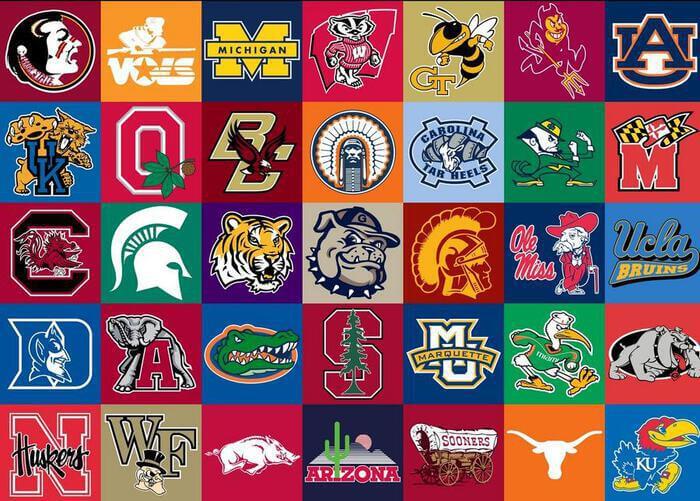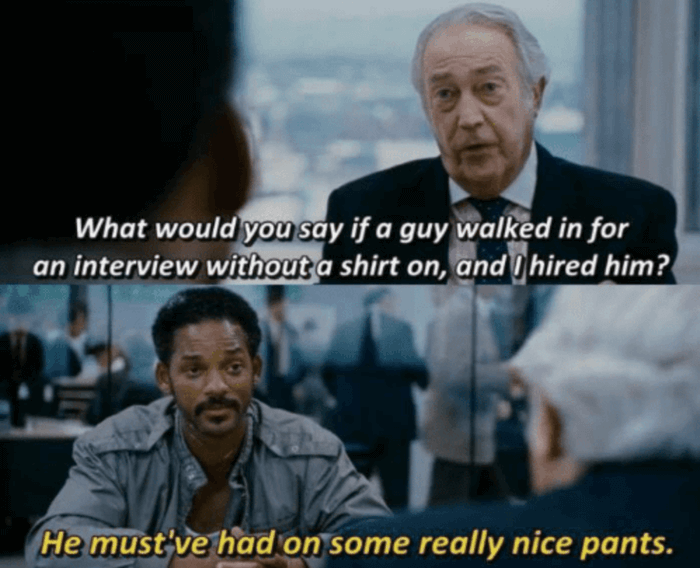
How do I ace a college admissions interview?
First off, breathe.
Because below,
I’m going to hit you with seven of the best interview tips for really nailing your college interview.
1. DON’T Suit Up
(Unless they tell you to.)
A big mistake is overdressing the part.
Just because you’re doing an interview with Princeton doesn’t mean you should show up like you’re giving a presentation to a Fortune 500 CEO.

But what’s wrong with dressing in my best duds? Doesn’t looking better mean doing better?
Not always.
Overdressing can make both you and the interviewer uncomfortable. You want to match the level of attire of your interviewer, not overdo it.
That also doesn’t mean show up in a graphic T and pastel shorts.
But if the interviewer says it’s casual,
trust that it will be casual
(especially if you’re meeting in a public place).
A nice button-down or a simple dress will do just fine.
Here's another tip: Take 3 seconds to Google your interviewer and figure out when they graduated. The age of the interviewer tends to make a difference in terms of the formality you should expect.
Younger alumni interviewers typically prefer a more casual vibe when interviewing prospective students. Older alumni, however, may appreciate a more conservative, traditional button-down look.
2. DO Keep Your Guard Up
Even though you don't want to be too formal in how you dress/approach the interview, you also don't want to be overly casual.
No matter how "laid back" or "chill" your interviewer seems, you must remember that
the interview is evaluative and you are always being judged.
I don't say that to make you nervous.
But don't let your guard down.
Don't try to appear "more vulnerable" or show your "human side" by talking crassly or discussing something that reflects poorly on you.
The interviewer is not your
therapist.
The interviewer is not your
college counselor.
The interviewer is not your
friend,
to be quite frank.
Yes, the interviewer should like you as a person. But their job is to write up an honest report of you to the admissions committee.
Don't give them something bad to write about.
3. Just Take the Dang Bottle of Water
This is one of the biggest (and most hilarious) problems that students worry about.
What happens if they offer to buy me a water or cup of coffee?
I don’t want to spend their money!
What if they think I’m using them?
Oh no, they're going to think my entire interview is a sham to get free water from schools that have billions in endowments!

Chill out. Play it cool.
If they offer you something to drink, graciously accept.
For one,
this makes you seem more receptive right away.
The interviewer is there for you, let them treat you in a friendly way!
Don’t make yourself seem closed off because you’re too humble to accept a drink from someone else.
And for another, you might actually need a drink! Nothing worse than chopping up the flow of a good answer with a dry mouth. Get your free liquid on!
Heck – if you see that they don’t have something to drink,
offer them a water.
The buck-fifty you spend might start you off on a positive note.
4. Go Ahead and Have A Big Mouth
This is SO important.
KEEP TALKING!

You are meeting with a person who has never met you and essentially needs to know about every aspect of your life.
This is different from a regular interview – where they might inquire about your ability for a specific position.
The person you are going to meet (usually a school alum) is
trying to figure out if you – as in a whole person – would be a good fit for the campus.
Don’t cut yourself short by giving minimal answers! It may seem awkward to share so much, but it is actually very helpful for the interviewer.
Tell stories, talk about interests, and
make sure you have a bunch to say when they hit you with the opening line “So Tell Me About Yourself.”
5. Ask Some Interesting Questions

This last one is obvious. Do some homework about the campus and be prepared to return the favor and ask questions at the end.
Don’t just ask something you could have found out by Googling.
Here's a great list of
80 interview questions to start.
6. Small Talk Makes a Big Difference
The cliche that people
hate small talk is misleading.
Sure, small talk can feel trite.
But it's a heck of a lot
better
than the alternative --
awkward silence.
Have a bit of small talk prepared for filling in the natural awkward silences that will occur during your interview,
especially at the start and end
of your interview.
These moments are like the "on" and "off" ramps to the metaphorical highway of you cruising through your interview at 80mph. Even if you do great on the actual "interview" (highway) portion of your interview, it doesn't mean much if you total your car getting on or off that highway.
When you've just entered your interviewer's office, or you're just getting seated with your interviewer, or you're waiting in line for coffee, or you're walking back to your car...
None of these situations are part of your actual "interview." You won't be getting grilled on your love of biology while you're waiting in line at Starbucks.
However, you're
still being evaluated
during these moments, and if they feel awkward that will reflect poorly on you.
The
solution?
Small talk.
OK, great.
But how do you "get good" at small talk?
Like anything else,
practice makes perfect.
The night before your interview, take 20 minutes to do a quick Google search for:
-
The weather
-
Local sports scores
-
Front page of the
New York Times
-
Front page of the college's student newspaper
Are there any TV shows you've recently seen, or books/articles/magazines you've read and enjoyed?
Just be mentally ready to unleash your small talk when needed, and you'll be able to avoid awkward silences and lulls in conversation.
7. Show up Early
Don't be late.
It's that simple.
But if you are late, be honest and stay positive, like one of our Essay Mentors did
when his 150-pound English Mastiff got in the way of his Harvard interview.
And that’s it! Those are my seven biggest points to nailing an interview.
Put in the time and remember,
the interview process is not about luck.
Luck is just when preparation meets opportunity.







